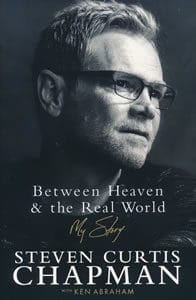Excerpt:
Steven Curtis Chapman: And so here I am saying, you know, pretty quickly, “Bible says don’t let the sun go down on your anger, and we’re angry and so, the sun’s going down. We’ve got to fix this, ’cause I’m the fixer. We’ve gotta fix this right now.”
Mary Beth Chapman: And I would say, “Goodnight” (Laughter) and go to sleep!
Jim Daly: She would roll over.
Steven: And she would roll over and go to sleep.
Mary Beth: You didn’t like that very well.
Steven: I did not like that, because I had to fix it, you know, and fix it now.
End of Excerpt
John Fuller: Well, that’s part of a conversation we had last time with Steven Curtis Chapman and his wife, Mary Beth about some of the challenges they faced in their marriage and you’ll hear more from them today on “Focus on the Family” with Jim Daly. Thanks for joining us. I’m John Fuller.
Jim: John, last time we shared about Steven’s incredible music career. I think he is the most, what’s the right word?
John: Decorated or awarded or recognizable.
Jim: Yeah, Christian musician that’s ever lived. That’s pretty big. And I know he’s sitting across the table from me, and I don’t say that to embarrass him.
Steven: I don’t have my decorations on me now. Every time they say that, I’ve got to picture a Christmas tree, like I have all these little things hanging off of me. (Laughter)
Jim: Yeah, he’s got a lot of bulbs hanging from him.
Steven: Yes. (Laughter)
Jim: But it’s awesome. I mean what an incredible career. We talked about his upbringing; the fact that his parents divorced, even though they love each other and his parents are doing okay now, well now.
Steven: Yeah.
Jim: But they are still divorced. And we talked about the impact on them and the impact on their marriage. Some of the fun stuff—their first date—those good things. We left off last time just beginning to peel back from Steven’s autobiography Between Heaven and the Real World, where their marriage started to struggle. And if you’re in that spot, if your marriage isn’t singing a happy tune, just to use a musical phrase, this is the program you want to listen to, because we often look at Christian leaders, Christian musicians, them as married couples, they must have it all together. His wife, Mary Beth, must just fawn at his feet because he’s so wonderful. But you know what?
Steven: (Whispers) Most of the time. (Laughter)
Jim: The reality is we are all human, and you two are human, even though you’re the most decorated Christian musician of all the world. And that’s what I love about you two is, you are so real, and I guess let me formally welcome you back to the program.
Mary Beth: Thank you.
Steven: Thank you. Thank you guys.
Jim: We did leave off last time where your marriage was struggling. You painted a bit of that picture. Let’s recap that a little bit, kind of pick that up there. How was that coming out in your marriage and your relationship? What year or month or week or hour–
Steven: Hour, yes! (Laughing)
Jim: –in your marriage did that start, and how did it begin to undermine your love for each other?
Steven: Yeah, well, it was, yeah, hours in. And as Mary Beth had said on our earlier time together, you know, even in college as we were dating, you know, it was very clear. I think, love at that point is a bit blind because even though, you know, as we would look back and go, yeah, we saw the signs early on that we were two very different people in the way we would view things or process things. You know, you’re kind of you’re so in love and you’re so, you know, crazy about each other, that that’s, oh, that’s, you know, that’s nothing. You know, kiss and make up and we’re going on.
John: We’ll get through that, yeah.
Steven: But when, you know, then when you’re married and the reality begins to set in of how different we were, how different we processed things, you know, it was our pastor/friend/counselor man who’s journeyed much of our life with us very closely, Scotty Smith, who’s inspired many of the songs that I’ve written with his teaching, just a great, great friend.
I think it was he who kind of first helped identify something as we were in one of our many counseling times with him when he said, “You know, the more I get to know you guys, I think the deal is it’s as if, if you know Winnie the Pooh world at all, Hundred Acre Wood, it’s like Tigger and Eeyore got married. It’s, you know, kind of like you put the two of those together. They’re pretty different.” You know you’ve got one who’s kind of, “Oh bother. Thanks for noticing,” more melancholy, which would be?
Mary Beth: That would be me.
Jim: Mary Beth, are you good with that? Being Eeyore?
Mary Beth: Oh, I am.
Steven: She has her gray on today. (Laughter)
Mary Beth: I am Eeyore.
Steven: She has her Eeyore shirt. (Laughing)
John: Well, that’s the way it goes.
Steven: She’s the most beautiful, lovely Eeyore on the planet, but yes, more melancholy.
Mary Beth: But Tigger has rubbed off on me.
Steven: And then here I am, bouncing in like, “Hey, come on. Who-hoo! It’s fun, fun, fun, fun, fun!” You know. Let’s go. Let’s dive in. Let’s saddle up our horses. Yeah, you know, all those songs.
Jim: That sounds like that sets up for some good arguments. (Laughter)
Steven: That sets up a challenge.
Mary Beth: Well, I think it’s not only that. I think it’s that we also are, I think where a lot of our disagreements have come in are God clearly, I think, calls opposites [to] attract.
Steven: Hm.
Mary Beth: And so, yes, the Eeyore and Tigger, very, very different, which sets up for some interesting discussions. I think layered on top of that we’re very much the same in our drivenness and in our desire for things to be right and perfect. Like, you know, if we’re gonna do it, we’re gonna do it with excellence. That’s all the same. But we come at it in different directions because of the Eeyore and Tigger. So, that is where the perfect storm [can happen].
Jim: And the interesting thing is God has a purpose in all that, doesn’t He? I mean Eeyore’s no less than Tigger.
Mary Beth: Well, yee haw! (Laughter)
Jim: Tigger may be it more fun, but Eeyore has a role.
Steven: Absolutely. And that’s the thing.
Jim: That’s what we’ve got to realize.
Mary Beth: Great. I got the Eeyore role! (Laughter)
Steven: Playing the role of Eeyore will be Mary Beth Chapman.
Mary Beth: Where’s my tail?
Jim: I can so relate, Jean and I are bit like this.
Steven: And playing the role of Tigger will be Steven Curtis. But you’re exactly right, Jim, and that’s the thing that I think early on we began to have to realize, and I blew it in so many ways early on because of my Mr. Fixit mentality. And what God had to really begin teaching me, and I say “begin” because I’m still learning it after 32 years.
Jim: Amen.
Steven: And I tell a lot of stories in the book about that, is that God has so much more in mind with this idea of marriage than what my little narrow view was coming into this.
Jim: Let me ask you this to help those who are listening that are struggling. When you looked at your perspective on marriage and what your box looked like, all those adjectives in there, what did that look like? And now being married as long as you’ve been married and going through some stuff and doing better, what does God’s box look like when it comes to marriage? What are those adjectives? Can you pull those out?
Steven: Well, I’ll borrow from one great book I read not too long ago by Tim Keller.
Jim: Yeah, that’s a good one.
Steven: Saying what if, you know, what if God’s idea of marriage is a lot more about making us holy rather than making us happy?
Jim: That’s it.
Steven: And I think I came into our marriage thinking, you know, I’m supposed to make you happy; you’re supposed to make me happy; we’re gonna complete each other. It’s all of that. I need you and you need me, and this idea that, okay, we’ve got to get this figured out and right.
And yet, realizing that God’s idea of this is—and you mentioned it earlier in our earlier program—is to begin to peel back the layers and say, “Let Me show you.” Nothing will ever show you how selfish you are, how broken you are, like marriage, which is why it is the ultimate of God’s idea of how He’s going to reveal to us our need for Him, our brokenness, and His amazing plan for us—
Jim: Yeah.
Steven:–is nothin’ will do that like marriage will. And yet, when those layers start to get peeled back and you start to realize that, you know, I think for, again, in me that idea of, wait a minute, we’ve got to fix this. You know, and you layer on top of that the, as Mary Beth mentioned, the enemy who is using every one of those differences and every one of those little broken areas to say, “See, this is a mistake. This was wrong. This was a wrong idea.” And yet, God’s working in all of that if we are willing to allow Him to work.
Jim: If you’re humble enough to see it that way. And that’s probably the biggest thing in marriage is pride. And Mary Beth, let me ask you this. I was gonna ask Steven this, but I think it’s better coming your direction. Did you ever feel like Steven’s success in music, his drive toward excellence that you just mentioned for both of you, did his music ever become a mistress in your marriage?
Mary Beth: No. It didn’t. I think that there’s a temptation for it to be. I think early on he decided, you drove a stake in the ground, I think, and from the get-go your music was so centered around your relationship with Christ, but then family. He talked about family all the time.
And while I think there were probably temptations, and maybe so, maybe in the quiet places where you had to kind of wrestle out, you know, what your next steps were and stuff, maybe you came to that conclusion. I’ve never felt that.
Jim: That’s good.
Mary Beth: It was certainly a lot of pressure, and it was certainly us trying to decide how do we do family and how do we do this thing that’s taking off in the early ’90s, escalating? I had three young children, you know, we—I had them (Laughter), but he was a part of it. And it’s crazy, ’cause you kinda have to make a decision, you know, what are we gonna do with this career? What do you say “yes” to and what do you say “no” to? So, certainly it was busy and certainly it was intense, but that’s the thing that I will go to my grave saying about the man that’s sitting next to me, is he has done it as right as I think any sinner can.
Jim: That’s excellent because many men struggle in this area particularly. I’m sure some women, professional women do, as well.
Mary Beth: Yeah.
Jim: But Steven, this is a teaching moment where you can speak to the heart of men who do make their vocation, their work, a mistress in their marriage. In other words, they stay late at the office; they’re trying to climb the ladder—whatever that means. Speak to those men who have put other things before maybe even their relationship with God and certainly their relationship with their family.
Steven: Yeah. Well, we as men, and I think all of us as human beings, but we run towards what we are most competent at. We talked earlier about golf, and I’m terrible and I run away from golf, because any time I get asked, I’m like, go the other direction. Pick up a guitar, and I feel competent. I feel like this is the one thing that I do well that I can do. Enter into marriage, I don’t care who you are, you’re not competent because we’re broken, and it is going to be a challenge. And thankfully God put people in my life, mentors, some through books I read, some through just pastors.
I think I began to realize that I’m gonna need people to keep me accountable, because I want nothing more than to finish this journey. I don’t care how many awards or records are sold, I want to finish it. That’s the reason I wrote the song, “I Will Be Here.” I want to be able to say at the end of this journey, we’re together. We’re here together. That’s what’s most important. That’s what I want to make a priority.
Now the fact is, I’m gonna be incompetent. It’s gonna be terrifying on lot of days for both of us. I’m not gonna feel like I’m good at this, and I want to fix it and I want to run to the things I’m good at. But God, help me keep engaging in this, because this is where the real rewards and awards lie–if we can finish this journey together, if we can raise our children together.
We stood at the crib of our first granddaughter, and I’ll get emotional again talking about it, because this was after our journey of losing Maria, and the darkest things that would destroy a marriage and felt like all hell was coming against us, and we stood together with our arms around each other at the crib of our first granddaughter and said, “You know we did this. We did this together by the grace of God.” And boy, there’s no Grammy award, there’s no nothin’ on the planet that can come close to the feeling of the joy of that moment and the moments, many moments like that, that we’ve had together.
Jim: No, that’s beautiful. And that is the end goal, isn’t it, when you look at it all? I’m thinking, John, of the folks that are struggling in their marriage. They’re hearing Steven Curtis Chapman and his wife, Mary Beth, talk about their struggles. If you’re in that spot, Focus has so much to offer you. That’s why we’re here. We have Hope Restored, which is an intensive marriage counseling opportunity; it’s four days. They have an 84.7 percent success rate after two years with those couples.
We want to see literally thousands of marriages saved through that effort, particularly. But even if you’re struggling a little bit to have a more vibrant relationship, you don’t understand, you know, putting yourself aside and laying yourself down for your mate, let us help you better understand how to do that. And certainly getting Steven Curtis Chapman’s book, Between Heaven and the Real World, is a great start. But there are other resources we can provide you, as well.
John: Yeah, we’ve got CDs and books and events and so much for you, and the starting point is gonna be http://focusonthefamily.com/radio, or just give us a call. Our number is 800, the letter A and the word FAMILY.
Jim: Mary Beth, in the book you both talk about that time in your life when depression hit, and for you it was even clinically diagnosed.
Mary Beth: Sure.
Jim: My wife, Jean, has gone through that. She had a brother who committed suicide. Many families are struggling with this issue of depression, and many families even here in Colorado Springs. We’ve had too many teen suicides occur; I think 9 in the last 13 months between two schools just in our little district here.
Mary Beth: No. Oh, I’m so sorry.
Jim: Something’s going on, but from that personal connection that you have, going through that kind of a dark period, I’d love to hear your perspective on that. And then a husband, Steven, trying to love his wife in that moment, how to keep that in perspective. Let’s start with you, Mary Beth, on just being depressed and what that feels like.
Mary Beth: Yeah. It doesn’t feel good. (Laughter) And it kind of goes along with that Eeyore personality a little bit. I guess Will Franklin was about 1, and his [Steven’s] career, the Great Adventure days, was just kind of starting to escalate. It was kind of all the worlds colliding, and I had been struggling, I think. I couldn’t identify what was happening and it was even going on before we were married, I think. And it just became very apparent that I needed to go get some help. It was a really, really dark time. Um…
Jim: Let me just pull that out a little bit, because some women, particularly but men too, don’t even know how to recognize those signs. What was happening in your life? This is before the loss of your daughter.
Mary Beth: Oh, this is, yeah.
Jim: It was an undercurrent for you. But describe what it felt like and what you noticed, maybe between the two of you, that you thought maybe something is here that we need a little help with.
Mary Beth: Yeah. I think there was a lot. His perspective is a little bit better, but I was just not handling well becoming a mom for the third time. We were moving into a house. We had, you know, we had been living in an apartment and we were moving into a house. He was getting ready to leave for several months on the road, and I think in my mind with that more sad personality anyways, a lot of things began to stir up, and we knew that something was going on.
I was pretty angry and not myself, and it, I just, his, actually your manager was over at the house one day and we were talking about it was yet another change in the schedule and it meant more time away from home, and I just lost it. I just had I guess what we called a breakdown, and you carried me into the house and said, “Okay, we need to go get some help.” And I’m like, “We do. We need to go get some help.” And so, it was a super dark time.
Jim: Sounds like you were feeling overwhelmed.
Mary Beth: Very, very overwhelmed, very much like this is never gonna change; this is never gonna end; it can’t get better; all those things. I can’t fix it. What am I gonna do? I have these little people I have to take care of. My husband’s getting ready to leave. I’d had to have gall bladder surgery.
Jim: So, no light at the end of the tunnel.
Mary Beth: There was no light at the end of the tunnel. And yeah, there wasn’t even a train at the end of the tunnel. There was just no light. (Laughing) No light. And so, it was really good to sit across from a professional who could really help identify, “Hey, this is what you’re struggling with,” and “Hey, I can help you with this.”
And that was good news. But it’s been a long journey, and it’s still ongoing, ’cause as you can imagine, here’s a husband who has this career that takes him away from home; I’m raising children. We went on the road with him and then we did some tours at home and then we’d go back on the road with him, always trying to go, what is the best for our family? He was always very good at trying to just be right there with me in it. And then, you know, we lost our daughter in 2008, and so that kind of spirals you right back down.
Jim: I mean that had to be the world’s worst blow.
Mary Beth: Oh, yeah.
Jim: I mean to lose a child, they say is the most difficult thing for parents to go through.
Mary Beth: Right, right, yeah, we shouldn’t be together, we shouldn’t be sitting here. It is completely by the grace of God that we are, and I again started struggling with that depression; still am today really, with just the grief that you carry. I mean it’s been almost nine years, but there are just still those times that it kicks you in the gut and kind of takes you 200 steps back and you just have to continue the journey.
Jim: Can I ask you a question? My brother lost his son, my nephew, to cancer, and he and I have talked many times about what it feels like five years later. You’re talking nine years since you lost your daughter. Even in the Christian context, I don’t think you get over it.
Mary Beth: No.
Jim: That pain is always there. God may soothe your ache, but my brother thinks of his son every day.
Mary Beth: Yeah.
Jim: And I’m sure you think of your daughter every day. How do you cope?
Mary Beth: I think we cope probably very differently, which that’s probably part of the struggle of losing a child is you grieve very differently. You don’t grieve together as a married couple, you know.
Steven: I think that what destroys so many.
Mary Beth: So, that’s what destroys so many couples when it’s the ultimate loss of your child. You have a spouse that grieves completely different than the other one, and that’s what threw us into a tailspin.
I think, for me and my personality and my tendencies towards depression anyhow, I think of it 24/7; it’s always in my mind. There are times that it is better or, you know, like God soothes you and obviously we’ve had great restoration and great ongoing, you know. Our son got married; all of our children got married after Maria passed. We have four grandchildren now. And you begin to see the goodness in the land of the living and you can move forward through, by God’s grace.
But you know Steven probably has been able to deal with it maybe even a little better just simply because of his personality. And so, because of that, it can leave people very, very differently and isolated.
Steven: Hm, yeah. Well, I think for us, it is only because of the hope that we have, you know, a lot of people reaching out to us when Maria went to be with Jesus, and one dear friend, Greg Laurie, only a month before he lost his son in an accident.
Jim: Right.
Steven: [He] sent me a note and it was one of those few of the many things that people would say, you know, well-meaning things but so much of it just kind of bounced off, just couldn’t find a home ’cause you’re in so much pain. And he just said, “You know, I just feel like I need to tell you and remind you what you already know. Your future with your daughter is infinitely greater than your short little past.” We had five, the better part of five years with her.
You know it was one of those things that can sound like a cliché, but that is, that was and has continued to be the hope for us as Christians is that the story is not over. If we didn’t believe that, the grief, the sadness, the questions, the anger, all of that would overtake us if we didn’t believe that God does know the plans that He has not just for us but even for the life of our daughter, Maria, and that the story is just very, very far from over.
And [we’re] holding onto that hope, dropping our anchor in the hope that we have. And I love that Scripture that says we have this hope as an anchor, because we need to drop anchor sometimes every few minutes every day because the wind comes, the hurricane, you know the waves come and we feel like, you know, we’re drifting again. And then just dropping anchor, “God, these are Your promises.” And it isn’t what we’re feeling right now; it’s not what our circumstances are even telling us, but having to stand holding onto that truth for our marriage, for our family.
I mean there’s no reason, given where this journey has taken us, that we would be sitting here at Focus on the Family telling our story to you guys except for the grace of God and the promises of God that we’ve just held onto and just made that choice over and over again that, God, we’re gonna hold onto what You’ve promised, to believe that’s what’s most true.
Jim: And that’s what’s so beautiful about the story that, you know, when you got married, on your one-day honeymoon you had 50 bucks in your pocket, and look what the Lord has done. He’s blessed you with all the kind of favor; you’re, as we teased the last couple of days, the most decorated Christian artist. That means a lot of different things with Grammys and Emmys, I don’t know, all the other things that you earned. But really important, Dove Awards, and those things that recognize you for your profession.
But you know what’s amazing? You are two regular people trying to journey through this life, even with all the success. And I think that’s why so many are drawn to you and your story. It’s beautiful to hear how you have struggled, and how God has worked through your marriage, through your life.
You have experienced a lot of emotional trauma, and not everybody will experience the loss of a child, but you have lived through it and you have given us such great advice on how to manage those land mines in our lives. And you’ve been so boldly and refreshingly honest about it in your book, Between Heaven and the Real World, that everyone who reads this will be touched, and it will give them a guidepost on how to think differently, not to think mean-spiritedly toward God. He’s not handing out sticks and carrots. He loves you. He will allow you to go through valleys, and that’s what you guys have done, but you’ve emerged stronger in your faith is what it feels like. Are you?
Steven: Yeah.
Mary Beth: For sure, for sure. It’s been for sure a great adventure.
Jim: There’s another song title.
Mary Beth: And like you said, with the valleys and the mountaintop experiences, I think if there’s anything left for me to say, I would love to say that the story with Maria, the ongoing goodness of God is to watch our son. I love to speak to that, because not only did we lose a child, we have a son that’s walking through one of the hardest things you can walk through, and the guilt and the shame.
Jim: The guilt.
Mary Beth: But he is an inspiration to watch, and so many people ask me, that’s the first question they ask is how Will is doing. And through Steven writing this book, we really wanted to pay honor to our son, because he truly is an inspiration (Weeping) and that has been one of the greatest joys of us surviving this, is watching him give himself to other people in pain, and so, we just honor him through this whole process.
Steven: Yeah, definitely, definitely some of the beauty that has risen from the ashes of that chapter of our story and is continuing to. It’s been amazing.
Jim: Well, I believe it. In Romans 8:28 He makes that promise that all things work for good.
Mary Beth: He does.
Jim: You don’t always feel that way–
Mary Beth: Right.
Jim: –’cause in the middle of it, you’re saying, “Lord, what possible good could come from these ashes?”
Steven: Hm.
Mary Beth: Right.
Let me turn to you, the listener. If you’re in that spot where your marriage is struggling, your family feels like it’s slipping away, call us today. Don’t wait. I mean that’s why we have counselors; that’s why we have other resources to help you. And if you want to be a part of the saving of these marriages—last year alone 130,000 marriages saved–
Steven: That’s awesome.
Jim: –I’m so proud of that number—and if you can help us today, that would be great. Don’t worry about the dollars. If you can’t afford to donate to get a copy of the book or if you need help, just get in touch with us. And to those who can help us in this mission, join us; be a part of saving marriages, not only in this country, but literally around the world.
John: And you can find the help you need through our counseling team or our Hope Restored program when you call 800, the letter A and the word FAMILY. Or stop by www.focusonthefamily.com/radio to learn more.
When you get in touch, ask about a CD or a download of our two-day conversation with the Chapmans. I’m sure that someone you know could benefit from their encouragement. And by the way, that CD and download, those are going to contain a lot more content than we could fit in, than these two days of broadcasts.
We’d also like to send a complimentary copy of Steven’s book, Between Heaven and the Real World to you. Just make a generous financial contribution to this ministry today. Donate at www.focusonthefamily.com/radio or when you call 800, the letter A and the word FAMILY.
And if you’re on Facebook, we did a Facebook live videocast with Steven and Mary Beth about their book and there was a real “ah-ha” moment for Jim. We had almost a half million people see this video. Let me encourage you to look for it. We’ll link to it at our radio page.
Well, coming up next time on “Focus on the Family,” Sadie Robertson,” one of the famous “Duck Dynasty” family members will describe how to courageously live out your faith and how to dream big for your life.
I’m John Fuller and on behalf of Focus president, Jim Daly and the entire team, thanks for listening. Join us again next time, won’t you, as we once again, help you and your family thrive in Christ.





















